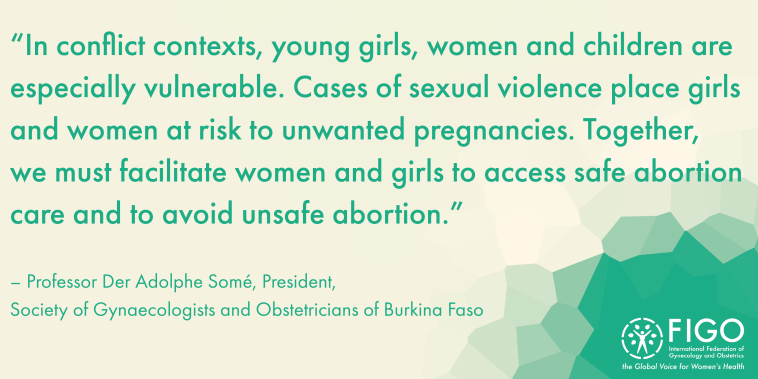#EmbraceEquity: Women’s access to sexual and reproductive health and rights in humanitarian settings
To mark International Women’s Day 2023, FIGO is highlighting the need to embrace equity in women’s health care. Women and girls in crisis settings are at heightened risk of having limited access to essential health care – including sexual and reproductive health services. To defend the rights of women and girls in humanitarian contexts, it is essential to promote and protect the provision of health services.

The increased vulnerability of women and girls in humanitarian crises
In crisis settings, women and girls face significant hardships when trying to access sexual and reproductive health and rights (SRHR). Chronic fragility and displacement among women and girls puts them at high risk of unwanted pregnancy by increasing their risks of sexual violence, transactional and coercive sex, human trafficking, and other forms of sexual exploitation and violence.
In humanitarian contexts women and girls may face discrimination due to their legal status. When seeking health care, they are at an increased risk of being subject to discrimination and other human rights violations, such as sexual and gender-based violence (SGBV), exploitation, and forced marriage.
Despite a culmination of factors that place vulnerable women and girls at increased risk of unintended and unwanted pregnancy, refugees and internally displaced people are systematically denied access to sexual and reproductive health care, including abortion care, often even when it is legally allowed.
Calling for women and girls’ right to SRH services in humanitarian settings
In a shared submission to the Office of the High Commissioner for Human Rights (OHCHR), FIGO and the Center for Reproductive Rights highlighted that “the right to bodily autonomy and sexual and reproductive health and rights (SRHR), including access to contraception and safe abortion services, must be upheld regardless of people’s location or status”.
Access to comprehensive SRH services – which can be challenging for many women and girls in settings considered peaceful – is further limited for those in humanitarian settings. Pre-existing gender-based inequality and violence are compounded by conflict and other humanitarian crises, where a lack of sensitisation, stigma, false information and the politicisation of SRHR issues (including a lack of regulation of 'conscientious objection' to safe abortion and family planning delivery) act to legitimise an inadequate government and donor response and a lack of prioritisation of safe abortion and family planning in service delivery.
Our submission to the OHCHR highlighted that:
Humanitarian settings increase the risk of women and girls to unsafe abortions due to reduced access to SRH services and supplies as a consequence of the collapse, weakening or disruption of the health system and the provision of health care. During humanitarian crises, patterns of discrimination and sexual violence against women and girls are aggravated, resulting in an increased risk of unwanted pregnancies and unsafe abortions.
The role of OBGYNs in promoting health services in humanitarian crises
Health care professionals and health systems must work to safeguard SRHR while ensuring that women, girls and those providing care are not criminalised for accessing and offering essential and timely abortion care. Health care providers in crisis settings should be trained to provide high-quality, rights-based SRH services, including through workshops addressing attitudes, values and beliefs alongside technical training.
Evidence-based equipment and medication should be made available during crises. Women in humanitarian settings should made aware of the types of SRH services that are available to them and under which conditions these services can be provided.
Providing the example of his national context, Professor Der Adolphe Somé, President of the Society of Gynaecologists and Obstetricians of Burkina Faso (SOGOB) highlights the need for OBGYNs to promote quality abortion care in humanitarian settings. In FIGO’s Advocating for Safe Abortion Project’s compendium, “Doctors as advocates: improving access to safe abortion care”, he says:
Burkina Faso has been facing a security challenge for many years. In that conflict context where the whole population is affected, young girls, women and children are especially vulnerable. Cases of sexual violence place girls and women at risk to unwanted sex and forced pregnancies. Each of us is called upon, starting with the government, the law and policy makers, [and] health practitioners. Together, we must facilitate women and girls to access safe abortion care and to avoid unsafe abortion.